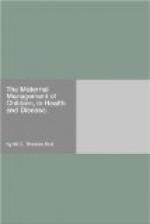It generally appears as an epidemic, and at those seasons when catarrhal complaints are most prevalent, and affects many or several at the same time. Isolated cases, however, frequently occur, which seem to prove the disease to be infectious. Some persons deny that it is so. Mothers and nurses, however, who have not had the disease, will often contract it from the child under such circumstances, and thus it will be quickly propagated through the family. The nursing mother will occasionally take it from the infant at her breast. The child who has caught it from others whilst at school, and brought home in consequence, will communicate it readily to his brothers and sisters, although the disease did not exist previously in the family or neighbourhood, and was brought from a distant part of the country. All these instances are surely proofs of its infectious character, and point out the necessity of caution whenever hooping-cough may present itself in a family, and the necessity which exists for an early removal of the unaffected children from the sphere of its contagious influence. The infectious property diminishes as the disease declines.
Maternal management.—In the mild and simple form of this disease the medical treatment is one rather of prevention than cure, and the maternal management consists in assisting, by watchfulness and care, the fulfilment of this design.
In these slighter cases little more is required of the mother during the Jirst stage of the disorder (that is, before the cough becomes spasmodic) than attention to diet, regimen, and the excretions. The diet should be farinaceous, with milk, or as may be otherwise directed. The child must be confined to a mild equable temperature; in fact, to his apartment. It is a popular error to suppose that at this time change of air is beneficial to the disease: at a later period it certainly is so, but now injurious, and attended with great risk. Should the weather be cold, the little patient must be warmly clad, and flannel worn next the skin; this latter precaution should always be taken in the winter, spring, and autumn. Purgatives and other medicines will be required, and ordered by the medical attendant; the chief attention, however, of the parent must be directed to any change she may observe in the symptoms, breathing, etc.; she must be all on the alert to notice the first signs of local inflammation. Of this, however, we shall speak presently.
During the early part of the second stage, that is, when the cough becomes spasmodic, assuming its peculiar sound, the same diet and regimen must be continued, and the same watchfulness observed, lest any inflammatory symptoms manifest themselves.
Under the foregoing treatment the disease generally runs its course without any untoward event, and the child recovers perfectly. Sometimes, however, although the patient is quite well, and the disease on the decline, the cough still continues. In these cases, and at this time, it is that change of air often proves so very serviceable. The sea-side is preferable, if the season of the year permit; and salt-water bathing, commencing with the warm or tepid bath, and passing gradually to the cold-bath (if no complication forbid it), will also prove certainly and rapidly remedial.




